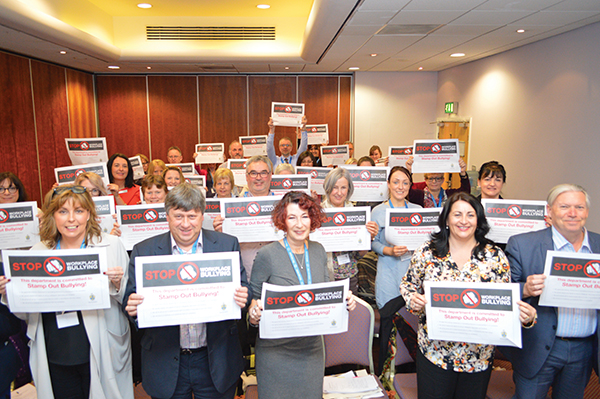Addressing the challenge of bullying and harassment in the workplace was the theme of a recent one-day masterclass in Liverpool.
Speakers joined with radiology managers and SoR accredited reps to discuss the issues which ranged from personal case studies through to legal considerations and how the Society is working with trusts to stamp out the problem.
There were also fascinating contributions on the impact of bullying on managers from Pam Black, a former president of the SoR, and an engaging workshop delivered by Dr Makani Purva from Hull and East Yorkshire Hospitals Trust on a project on tackling bullying. Here are some of the highlights...
SoR president Sheila Hassan started the day by thanking delegates for taking the issue of bullying seriously. Sheila pointed out that research carried out by the SoR showed that bullying was still an issue for many, so managers and reps in particular must play a significant role in stamping out the problem.
“It’s always going to be an issue unfortunately, but it’s the times we suffer from stress and our departments are under pressure, whether it be from cutbacks or to get more patients through, that bullying in particular can become a problem,” she said.
Pam Black, radiology services manager at Wirral University Teaching Hospital, gave a thought provoking and poignant presentation about her own personal ordeal in dealing with bullying.
Pam pointed out that bullying can affect anyone in a hospital environment, and that it is important to recognise that the problem goes beyond junior members of staff.
“Managers are human; we hurt, we cry, we bleed,” she said. “Workplace bullying is not like your typical school playground bully, that’s certainly not what I experienced at all.
“What I experienced was bullying within protocols, policies and procedures, to the extent I didn’t even know I was being bullied, I didn’t know what was going on.”
Paul Moloney, industrial relations manager at the Society, discussed the importance of working in partnership and managing change. Paul emphasised how the SoR is fully committed to partnership working.
“It’s about working together and it’s about recognising what the shared objective is,” he said. “With a partnership approach it won’t get rid of all your problems, but what it will do is send a much stronger message to staff that you have a culture of listening, working together, reminding everyone of shared objectives, and within that culture it’s a lot more difficult for people to turn around and accuse each other of bullying.”
Elizabeth Smith from law firm Howard Kennedy and sponsor of the SoR’s annual Rep of the Year Awards, explained to delegates the legal fallout around bullying and harassment at work cases.
Elizabeth explained that in the eyes of the law “harassment occurs when somebody is subjected to unwanted behaviour, which violates dignity, but causes them to feel degraded, humiliated or isolated.”
Emphasising the serious impact sustained bullying can have, Elizabeth recounted some of her past and ongoing cases where workers from a range of professions, including healthcare, had been subject to appalling bullying, but had successfully sued their employer and received large compensatory payments.
The second half of the day was kicked off by Dr Makani Purva, director of medical education and anti-bullying ambassador at Hull Royal Infirmary.
Dr Purva has led an anti-bullying campaign among the trust’s 8500 strong staff, creating the Professionalism and Cultural Transformation Academy, or PACT.
During her presentation, delegates were treated to a preview of the workshop Dr Purva delivers to staff at the trust. This involved role playing scenarios, prompting delegates into thinking about how their behaviour might be perceived by staff and patients, raising conflict resolution techniques and defining what constitutes professionalism.
Dr Purva had words of wisdom for any trust suffering from issues with bullying: “The most important thing was that we acknowledged we had a problem. Once we acknowledged that, we were on the road to recovery.”
The final speaker of the day was John O’Grady, an advanced level facilitator of the Wellness Recovery Action Plan (WRAP), an evidence-based method for getting well and staying well.
John talked about the history and methods of WRAP, and how the philosophy had been successfully used in many countries around the world, including Northern Ireland where he had been instrumental in introducing it.
John explained that WRAP has become an effective tool in coping and dealing with bullying, especially the more serious consequences from bullying.
Departments can sign-up to the Society’s ‘Stop Bullying’. Click here to find out more.
You can also email for supplies of the department ’Stop Bullying’ cards.
